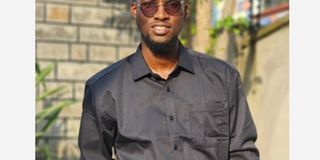Campus Confessions: My adventure inside the infamous "Mariamu" as a first-year student at Kabarak University

Moses Ogoti, a pharmacy student at Kabarak University and a spoken word artiste.
During the COVID-19 pandemic, we all faced one of the most unprecedented challenges in recent history, which taught us a great deal about resilience.
When restrictions were placed on attending church, it was particularly difficult for those of us who were used to regular fellowship with others.
Saturdays and Sundays, traditionally days of worship, were suddenly empty. What were we to do, sleep?
I was a freshman at the time, and the restrictions came on a Friday. As a committed Seventh-day Adventist, I had prepared for the Sabbath, but I didn't know what to do if we couldn't go to church.
Saturday, normally a holy day for me, turned into an unexpectedly lazy day. I spent most of it in the school canteen until my friend Ruto, who was also in first year, suggested that we visit another friend who had recently lost his mother.
We called some other friends and they agreed to join us. We got into a matatu, although even public transport had restrictions - only six passengers were allowed.
The matatu we eventually travelled in was full with twelve passengers, twice the allowed capacity. Despite the obvious violation, we decided to continue the journey.
After a kilometre or two, we noticed that a private car was following us. The matatu driver looked worried and I asked him if something was wrong. He mentioned that there seemed to be police in the car behind us.
Soon after, the car stopped us. Sure enough, it was the police. Angrily they ordered us to get out of the car. At first I thought they were joking, but things quickly got serious.
They asked us to identify ourselves, and one officer remarked that students like us were making life difficult for them by breaking the rules. Despite our attempts to explain, they wouldn't listen.
I watched in horror as a Mariamu approached, and I knew at that moment that we were in real trouble. Spending the weekend in prison seemed inevitable, which meant I wouldn't be released until Monday or Tuesday.
We were loaded into the Mariamu and taken to Menengai police station. All the time I couldn't shake the feeling that the police were just trying to scare us.
But when we arrived at the station and had to write our names in the incident book, reality set in. I watched my clean criminal record tarnish before my eyes, all because we hadn't followed the government's instructions.
As we were ordered to remove a shoe, our belts and wallets, I began to feel the weight of the situation. The OCS arrived and asked us all to show our school cards. Only two out of six of us had them.
The OCS gave us a stern lecture for about 30 minutes, warning us of the consequences of our actions and how we had broken the law.
In the end he let us go. I almost spent the night in jail that day, and the experience left a lasting impression. Since then, I've been careful to obey the law.
After we were released, Ruto and I went back to the cafeteria, where we had a cold soda and reflected on what had just happened.
As told by Moses Ogoti, a pharmacy student at Kabarak University and a spoken word artiste.

